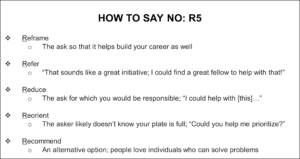HOW TO SAY NO: R5
American Heart Association Early Career Guest Blog
Sherry-Ann Brown MD PhD FAHA, Mehnaz Rahman MD
For many of us, to nurture our continuous and whole sense of well-being, we are in a constant process of learning to say “no”. Here is one scenario that can help provide an effective framework for saying “no”.
Consider a new junior attending faculty member at the same academic institution where she trained as a Cardiology fellow. Her pursuit of wellness in this new role has fallen to the sidelines, as she first tries to establish a sense of authority within a society that has only ever known her as a trainee. While navigating this unfamiliar territory, a surprising source of anxiety has come from responding to requests to collaborate on projects. She consistently accepted almost every single one. The fellow in her aimed to please.
Although she approached each with the same work ethic, her interest in them was not as equitably distributed. At the end of her first year, her cup had “runneth over” – she was overworked and overcommitted admittedly she felt by her own doing.
She then realized that she had agreed to those undertakings because she did not quite have the words ready at the tip of her tongue to say “no”. When respectfully declining a specific ask, she determined that it can help to have a practiced approach to the conversation, one that can produce a beneficial result for both parties.
As we discuss this scenario, we can recognize that in general, people appreciate ideas and potential solutions. Accordingly, we may not be able to fulfill every request, yet we can still be a resource and offer alternatives.
One framework for saying “no” is grounded in R5: Reframe, Refer, Reduce, Reorient, and Recommend. Saying “no” can be challenging. Sometimes we need to say “no” to the way the ask is presented or the specific focus of the ask.
If we can perceive benefit from modifying the ask so that it actually fits with our career goals and specialty interests, then we can say “no” to the original ask while reframing it to a more fitting ask for us.
If we choose not to reframe the ask, we can refer the asker to someone else who we feel could be interested in working on such a task.
Alternatively, we could reduce the original ask to limit the portion for which we would be responsible.
Further, often those asking do not know how full our plates are and may need to be kindly informed or reoriented, so that they can better understand your perspective as you say “no”; you can even solicit their input as you think about how to prioritize your time on pre-existing projects.
Finally, recommend a new deadline or seeking out more resources if you would find working on the opportunity valuable but time-consuming or limited in available resources.
Remember, those asking for your involvement are genuinely interested in working with you, recognize you as an asset, and will more often than not be receptive to your counteroffer. Saying “no” the right way will leave the door open to future opportunities that you may be waiting or looking for.
We can continue to recalibrate our expectations of ourselves, as we engage in projects that keep us passionate and hope that our journeys to wellness become smoother with time and practice.

“The views, opinions and positions expressed within this blog are those of the author(s) alone and do not represent those of the American Heart Association. The accuracy, completeness and validity of any statements made within this article are not guaranteed. We accept no liability for any errors, omissions or representations. The copyright of this content belongs to the author and any liability with regards to infringement of intellectual property rights remains with them. The Early Career Voice blog is not intended to provide medical advice or treatment. Only your healthcare provider can provide that. The American Heart Association recommends that you consult your healthcare provider regarding your personal health matters. If you think you are having a heart attack, stroke or another emergency, please call 911 immediately.”